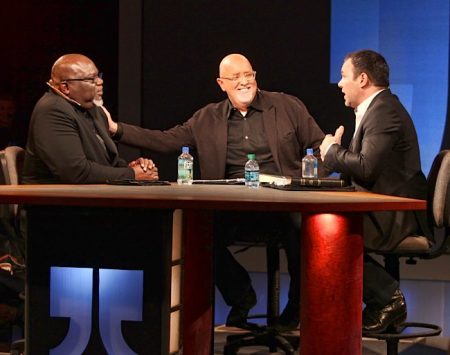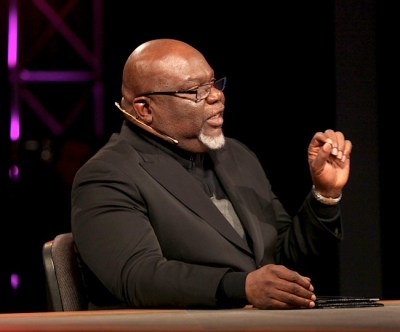TD Jakes Breaks Down the Trinity, Addresses Being Called a 'Heretic'

Bishop T.D. Jakes, pastor of The Potter's House megachurch in Dallas, Texas, was put on the spot during a theological roundtable Wednesday in regards to his beliefs about the Godhead and why, in some Christian circles, he is considered a "heretic."
Jakes and of a handful of other male Christian leaders were invited to participate in this year's "The Elephant Room" roundtable, hosted and moderated by Pastors James MacDonald and Mark Driscoll. The Dallas pastor was hit with several questions about how his theological beliefs have developed, specifically in regard to the Holy Trinity – a controversial issue which The Christian Post reported on in October.
The Potter's House senior pastor denied that he clings to a modalist position, although he confessed that he did at one time in his walk with God.
Modalism, a 3rd-century teaching accredited to theologian Sabellius, purports that the members of the Trinity are not three distinct, eternally co-existing persons, but that instead God, a singular spirit, discloses Himself at different times in three modes – a doctrine espoused by Oneness Apostolic Pentecostal and United Pentecostal Church International denominations.
During Wednesday's "Elephant Room" conversation on the "majors" of Christian doctrine, Jakes explained where he falls on the issue.
"My father was a Methodist and my mother was a Baptist," he explained. "I was raised in the Baptist church ... but I didn't really have a real committed experience with Christ until my father died. When my father died, I had a real experience with Christ, a real conversion with Christ and I had it in a Oneness church."
The minister emphasized to Driscoll that the Pentecostal congregation he was referencing, which he pointed out was not a UPCI church, was home to "Christians who believe in Jesus Christ, believe he died, rose from the dead, is coming back again — all the same things you do."
"How they describe and explain the Godhead in a traditional Oneness sense is very different than how traditional Trinitarians describe the Gospel. I was in that church for a number of years and raised in that church for a number of years," Jakes said.
"As I began to progress, I began to understand that some of the dogma that I was taught in the Oneness movement was very dogmatic, very narrow and not the very best description of how I now understand the Godhead," he continued.
"My struggle as I was ordained in the Oneness church was in several passages – sometimes the doctrine fit, sometimes it doesn't. When the doctrine becomes the primary thing, you force it into fitting in places where it doesn't fit. I really at this point in my life don't want to force my theology to fit in my denomination."
Referencing Gen. 1:26, Luke 3:21-22, John 14:11 and other passages that he believes point to Jesus, God the Father and the Holy Spirit as having unique distinctions, Jakes revealed: "That began to make me re-think some of my ideas and some of the things I was taught."

"I got kind of quiet about it for a while. When you're a leader and you're in a position of authority sometimes you have to back up ... for a minute and really think those things through."
Driscoll, near the end of the discussion, pointedly asked Jakes if he believes the Bible is "the perfect, inspired, final authority Word of God," to which Jakes responded "absolutely."
Driscoll then posed several other creedal questions in quick succession, to which Jakes responded in the affirmative:
"You believe there is one God, three persons: Father, Son and Spirit? You believe Jesus was fully God, fully man?"
"You believe he died on the cross in our place, for our sins?"
"You believe he bodily rose from death?"
"You believe that he is the judge of the living and the dead?"
"You believe that apart from Jesus there's no salvation?"
Jakes told Driscoll once more that "there is very little difference between what I believe and what you believe."
"For you, the issue between Trinitarianism and modalism at its essence is one God manifesting Himself successively in three ways, or one God, three persons, simultaneously existing eternally. Your best understanding now ... would you say it's 'one God manifesting Himself in three ways' or 'one God in three persons?'" Driscoll asked.
"I believe that neither one of them totally get it for me," Jakes revealed, yet expressing his agreement with the description of "one God, three persons."
"Here is why I am there. I am not crazy about the word 'persons' ... most people who know me know that ... my doctrinal statement is really no different from yours except for the word 'manifest' instead of 'person,' which you describe as modalist and I describe as Pauline," Jakes insisted, before quoting 1 Timothy 3:16.
The passage in the English Standard Version reads: "Great indeed, we confess, is the mystery of godliness: He was manifested in the flesh, vindicated by the Spirit, seen by angels, proclaimed among the nations, believed on in the world, taken up in glory."
"That is what Paul describes as a 'mystery' and I don't think we should do that," the bishop said. "Now, Paul is not a modalist, but he does not think it is robbery to the divinity of God to say God was 'manifest' in the flesh," Jakes argued.
"When we start talking about that sort of thing, I think that it is important that we realize that there are distinctives between the Father and the working of the Son: the Father didn't bleed, the Father didn't die, only in the person of Jesus Christ, coming back for us in the person of Jesus Christ ... Jesus Christ has been with us, but only indwelt in the person of the Holy Spirit. We are baptized into the Body of Christ by the power of the Holy Spirit. That is consistent with my belief system."
He added, "We are taught in our society that if we disagree within a movement, we leave ... we sever. I still have fellowship associations, relationships and positions within and without Oneness and Trinitarian movements because I believe that until we bridge the gap between our thinking, and humble both sides and say 'we're both attempting to describe a God we love, that we serve and that we have not seen, and that we are viewing Him through the context of the Scriptures but that with a glass darkly' – why should I fall out and hate and throw names at you when all that I know and understand, be it very Orthodox, is still through a glass darkly?"





















